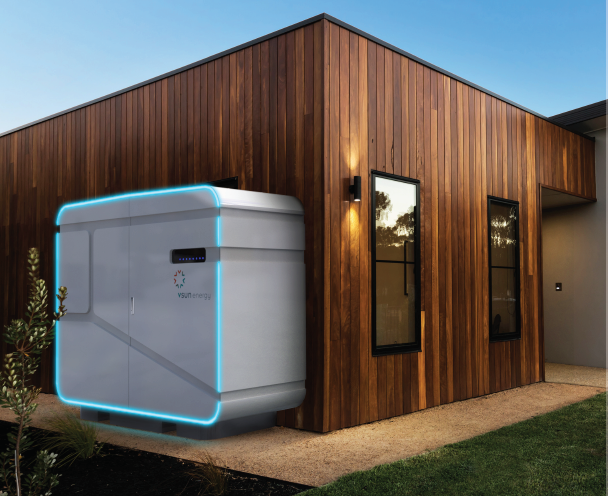
Australia’s federal government has committed millions of dollars in grants to companies involved in lithium battery and vanadium redox flow battery value chains, as part of a wider pledge to support resources and critical minerals sectors in the country.
Eight recipients of funding from the Modern Manufacturing Initiative, were announced today. Among them are Australian Vanadium, a Western Australia-headquartered company seeking to created a vertically-integrated vanadium redox flow battery energy storage business. Australian Vanadium will receive AU$3.9 million to fast-track its manufacturing capabilities.
Enjoy 12 months of exclusive analysis
- Regular insight and analysis of the industry’s biggest developments
- In-depth interviews with the industry’s leading figures
- Annual digital subscription to the PV Tech Power journal
- Discounts on Solar Media’s portfolio of events, in-person and virtual
Core Lithium, a company based in the Northern Territory will get AU$6 million towards the building of a battery-grade lithium hydroxide production pilot plant in Darwin Harbour. The Australian Stock Exchange-listed company is preparing to start construction of its Finniss Lithium Project this year, to begin exports in 2022 from a site which it said has around 9.63 million tonnes of 1.4% lithium oxide that could be accessed.
Australia’s government has been strongly criticised for not committing to a legally binding target for achieving carbon neutrality in the way that many of its international peers have already done. Minister for Industry, Science and Technology Christian Porter spoke of the importance of establishing a presence for Australia as a “crucial leader” in the modern resources, manufacturing and technology sectors involved, in a press release which did not mention climate change, decarbonisation or clean energy specifically.
The grants were made as matched funding in line with the aims of the Australian government’s Resources Technology and Critical Minerals Processing National Manufacturing Priority, which focuses on support for domestic manufacturing.
Other recipients of grants are:
- Brisbane METS Lab No.1, which will get AU$1.2 million support for a vanadium processing pilot plant
- Elphinstone, which is getting AU$5.1 million to develop battery-powered vehicles that can be used to support underground mining operations
- Batt Mobile Equipment (AU$4.5 million) which is also working on heavy duty electric vehicles for mining applications
- Albemarle Lithium (AU$4.9 million) which is working to recycle lithium refinery residue to be used in the construction industry
- Flip Screen Australia (AU$10 million) which wants to build advanced mining equipment
- Lynas Rare Earths, which is the biggest single grant recipient (AU$14.8 million). Lynas Rare Earths is developing a rare earth ore refinery for products that can be used in permanent magnet and electric vehicle production.
Australian Vanadium targets vertically integrated flow battery business
Australian Vanadium (AVL) said today that its grant will enable the company to commercially produce vanadium electrolyte for flow batteries. It will also allow the company to finalise a high-purity vanadium pentoxide processing route and to manufacture prototype versions of flow battery systems for residential and standalone power system (SPS aka islandable microgrid) applications.
The company has established a subsidiary, VSUN Energy, which serves as its battery storage manufacture and design arm, while it is developing vanadium extraction and processing resource in Western Australia to serve both the steel production and battery markets. Its project has been awarded Major Project Status from the Australian government and a similar designation from Western Australia’s state government.
“The grant will enable us to add further value to the vanadium products we plan to produce in Australia from the proposed development of the Australian Vanadium Project in the Mid-West region of Western Australia,” AVL managing director Vincent Algar said.
“The grant will provide support to AVL to achieve production of high-purity vanadium pentoxide, which is a key input to vanadium-titanium master alloys for critical steel applications and vanadium electrolyte for batteries. In turn this will assist development of the Project, with the Company now in discussion with offtakers for vanadium electrolyte in addition to vanadium pentoxide”.
Existing primary vanadium producers Largo Resources and Bushveld Minerals are pursuing similar strategies to target the battery storage market as the need for long-duration storage grows. Largo, which has vanadium mines and processing plants in operation already in Brazil, has established Largo Clean Energy, a US-headquartered energy storage subsidiary which will manufacture and deploy redox flow battery systems for the global market.
Bushveld meanwhile has vanadium plants in South Africa and is now building a vanadium electrolyte production plant through its subsidiary Bushveld Energy. While Bushveld is understood to not be planning to launch its own flow battery systems, the company has partnered with and invested in a couple of manufacturers in the space already: Anglo-American company Invinity Energy Systems and Austrian company Enerox-CellCube. Australian Vanadium also signed a local supplier agreement with the latter, in September last year.






